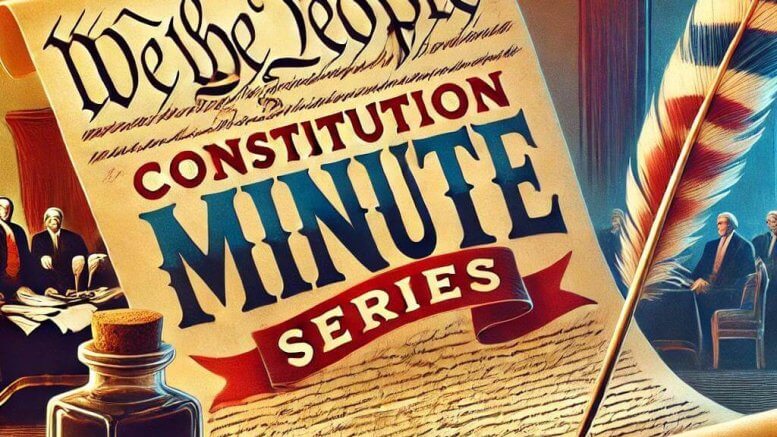“We the People” find our voices increasingly stifled by a “ruling elite” entrenched within NGOs and federal agencies. This administrative state, with its far-reaching policies, threatens the constitutional principle of a government that serves its citizens. Instead of fostering a government by and for the people, the administrative state has transformed into an oligarchy—a rule of the few over the many. Supported by an intricate network of clientele groups, this elite operates in a manner that disregards the average citizen’s needs and erodes the freedoms guaranteed by our Constitution.
The Administrative State: A Return to Pre-Constitutional Government
The rise of the administrative state represents a profound departure from the limited government envisioned by the Founding Fathers. Today’s ruling elite, comprising federal agencies and NGOs, exercises control over virtually every aspect of daily life. As Hillsdale College points out in the video above, “Why the Ruling Elite Is Anti-American,” the administrative state is anti-constitutional and represents “the rule of the few for their own sakes—a distinct and insular class of people rather than a trained elite.” This oligarchy is supported by clientele groups who benefit from privileges conferred by the system. Meanwhile, the average citizen finds themselves systematically disenfranchised, with little ability to influence policy or hold the administrative machinery accountable.
Hostility to Constitutional Principles
The administrative state’s hostility to constitutional principles is evident in its extensive regulatory reach. Hillsdale College highlights how the federal government dictates everyday aspects of life, from the amount of water allowed in washing machines to the composition of light bulbs in our homes. This overreach signifies a return to pre-constitutional government where power is concentrated in the hands of a few, diverging from the Constitution’s intent to limit government power and protect individual liberties.
Get Your FREE Pocket-sized copy of The Constitution and Declaration of Independence!
Click Here to get yours Today (Hillsdale Constitution Minute)
EPA Overreach and the Erosion of Property Rights
A poignant example of administrative overreach is the Environmental Protection Agency (EPA)’s “Waters of the United States” rule. This rule allows the EPA to assert control over small bodies of water on private land, often without due process or fair compensation. In *Sackett v. EPA* (2012), a family faced crippling fines for attempting to build a home on what the EPA deemed protected wetlands. This demonstrates how an unaccountable federal agency can exercise authority over individual property rights, reflecting a departure from the Constitution’s protection of private property and individual freedoms.
Weaponization of Federal Agencies: The IRS Targeting Scandal
The IRS’s 2013 targeting of conservative groups seeking tax-exempt status is a glaring example of administrative state overreach. The IRS used its authority to delay and scrutinize applications from organizations that opposed the administration’s policies, effectively stifling political dissent. Hillsdale College describes this as the administrative state “becoming intensely focused on things that legitimate government ought not to do.” The IRS’s actions demonstrate the danger of an unchecked federal agency weaponizing its power against American citizens, violating their First Amendment rights.
Federal Intrusion in Education Policy
Through initiatives like the Common Core State Standards, the Department of Education has exerted influence over local school curricula—an area traditionally reserved for state and local governments. This top-down approach has centralized control over education, limiting the ability of local communities to shape their children’s learning. Hillsdale College argues that such overreach is an inversion of the government’s priorities, as it focuses on areas beyond its constitutional mandate, thereby diminishing the role of local governance and parental influence in education.
CDC Mandates and Constitutional Concerns
During the COVID-19 pandemic, the Centers for Disease Control and Prevention (CDC) implemented sweeping mandates, including mask mandates, business closures, and eviction moratoriums. These measures sparked debate over the extent of the CDC’s authority, particularly since many of these actions bypassed legislative approval. While public health is crucial, the CDC’s approach raised concerns about constitutional justification and the limits of administrative power. Hillsdale College emphasizes that the administrative state “becomes intensely focused on things that legitimate government ought not to do,” intruding into personal and business realms without direct accountability.
Surveillance State: DHS and the Erosion of Civil Liberties
The Department of Homeland Security (DHS) has been criticized for its surveillance programs that infringe on Americans’ privacy rights. The widespread collection of personal data without proper oversight exemplifies how the administrative state has overstepped its bounds. Hillsdale College argues that this behavior reflects an administrative state unconcerned with the government’s legitimate tasks. Instead of protecting civil liberties, it erodes them, demonstrating the dangers of an unchecked administrative apparatus.
Neglect of Core Governmental Responsibilities
While the administrative state focuses on regulating every aspect of citizens’ lives, it often neglects its fundamental responsibilities. As Hillsdale College notes, “major cities have chronic amounts of unsolved murders,” and in cases like Detroit, thousands of unprocessed rape kits took more than a decade to address. Cities like Portland, Oregon, appear willing to allow groups like Antifa to take over the streets, enforcing laws as they see fit. At the national level, the federal government seems unconcerned with maintaining territorial integrity, failing to address illegal immigration effectively. These examples underscore how the administrative state neglects its core duties, instead pursuing regulatory control that infringes upon individual freedoms.
The Inverted Priorities of the Administrative State
The administrative state has fundamentally inverted its priorities, fixating on areas outside the purview of just government while neglecting the essential functions it was established to perform. Hillsdale College describes this inversion as the state becoming “hostile to the Constitution” and unable to fulfill the expectations of its Progressive Founders. The administrative state’s actions betray the constitutional framework of limited government, allowing an unaccountable ruling elite to impose their will on the citizenry, turning “We the People” into mere subjects of bureaucratic rule.
Conclusion
The administrative state’s overreach represents a profound departure from the constitutional principles that define our republic. The concentration of power in the hands of an unaccountable ruling elite has eroded the influence of the people, contradicting the foundational idea of a government by and for the people. From property rights infringements by the EPA to the IRS targeting political dissent, federal intrusion into education policy, and the unchecked power of surveillance programs, the administrative state’s actions vividly demonstrate its divergence from constitutional governance. To reclaim our constitutional republic, we must challenge this overreach, restore the proper role of government, and ensure that “We the People” once again have a say in the policies that shape our lives.
For further insight into this critical issue, we recommend exploring Hillsdale College’s Constitution 101 course, particularly the lecture “Why the Ruling Elite Is Anti-American,” which delves into the administrative state’s departure from constitutional principles.




